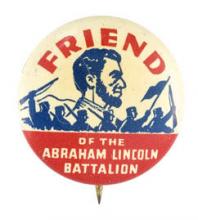inspiration + perspiration = invention :: T. Edison ::

It's Memorial Day weekend, the so-called official start of summer, but also a time set aside to honor those who served in the military. There are many fallen heroes to remember during this time. Yet few if any know of a small group of people who answered a call to service outside of the regular military. Years before the country officially entered World War II, a group of Americans went to Spain to fight.
Spain had been in decline throughout the 1800s. Though World War I actually gave the country a bump in the export market, industrialization was a rough road. Strikes, labor movements, and unrest grew, prompting a defacto military dictatorship to take power. That changed in 1931 with the founding of a republic by a coalition of minority political parties. Despite starting with strong populist support, there were soon fissures, and a military revolt occurred in 1936. In the fighting a leftist officer was killed by a political opponent. The resulting outrage led to full-out civil war.
On one side were the Republican forces, those dedicated to the ideal of a liberal democracy with support from labor and Communist groups, while on the other were a mixture of military officers, conservative factors, and Fascist sympathizers. Even that description is overly simplistic. As with any civil war, old loyalties were strained and new alliances formed. Both armies appealed to other countries for help: Germany, Italy, the Soviet Union, England, France. There was no official support given, though Stalin, Hitler, and Mussolini all sent aid of various kinds.
Angered by their nations' neutrality, volunteers around the world formed units to defend the Spanish republic. In the United States, this movement gave rise to three battalions named for major figures in history: Abraham Lincoln, George Washington, and (in eerie foreshadowing of the bloody conflict) John Brown. 2,800 Americans fought in the conflict, while 125 also served in auxiliary roles to provide medical and technical support.
The members of the combined volunteer units were diverse in background, ethnicity, politics, and experience. As summarized by an article at the University of Pennsylvania's website,
"The Lincolns ... included seamen, students, the unemployed, miners, fur workers, lumberjacks, teachers, salesmen, athletes, dancers, and artists. They established the first racially integrated military unit in U.S. history and were the first to be led by a black commander.... Self-motivated and ideological, the Lincolns attempted to create an egalitarian 'people's army'; officers were distinguished only by small bars on their berets and in some cases rank-and-file soldiers elected their own officers. Traditional military protocol was shunned, although not always successfully. A political commissar explained the politics of the war to the volunteers and tended to their needs and morale."
After three long years of fighting, the Republic fell in 1939. Approximately 750 American volunteers died; the rest returned home to a country still facing economic troubles. Eventually the United States would declare war in Europe after the bombing of Pearl Harbor. We often remember World War II as a fight against fascism, but the truth is that our fight against Hitler was based on his alliance with Japan.
The Lincoln Battalion and fellow volunteers believed so strongly in this fight, they entered into a dangerous foreign land without government support. They did not receive any reward after their service: no GI bill, no pension, no high honors, no recognition. They fought a losing fight to the end and then returned home with no welcome beyond that given by their grateful families. Years later their association with Communism (both prior to their involvement in Spain and via the USSR's support of Republican forces) led to personal and professional hardships for many.
These people were not perfect. Perhaps now we would view them as radical extremists who had no business interfering in an internal national conflict. Whether they were right to do what they did is as debatable as any war. What is not debatable is the sacrificial nature of their service, or how they have been forgotten by so many. As you remember our veterans this weekend, take the time to remember a truly American force dedicated to fighting what they perceived as the good fight.
If you'd like to learn more about these volunteers, check out the Abraham Lincoln Brigade Archives. You can also read copy from the Guardian's original reporting from that time period online (such as "Spanish republic fighting grave revolt" from July 1936).
Sources





